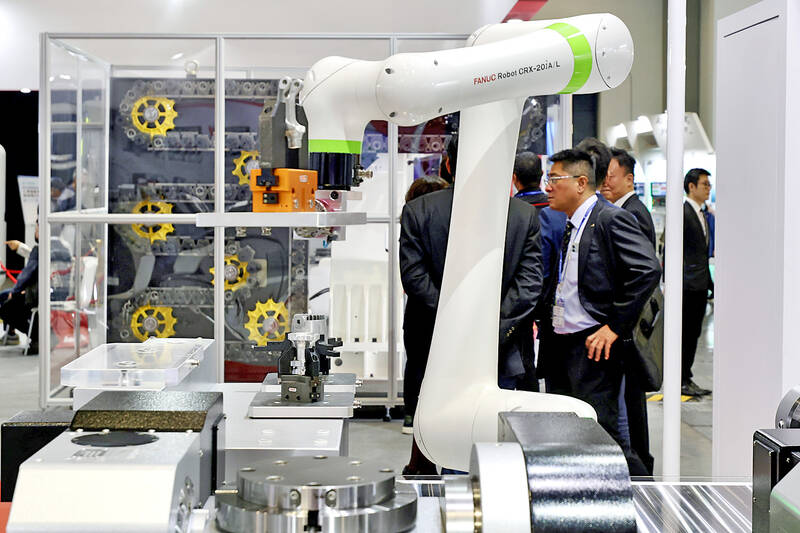Taiwan’s industrial production last month rose 5.07 percent from a year earlier, as local technology firms benefited from strong demand for electronic components used in artificial intelligence (AI) and high-performance computing applications, the Ministry of Economic Affairs said yesterday.
Industrial production measures the change in the value of output produced by the local manufacturing, mining and utilities sectors.
Last month, the industrial production index was 96.31, with manufacturing output — which accounted for 95.29 percent of the industrial production index — rising 5.29 percent to 96.4, up for the 11th consecutive month to the second highest in history, it said.

Photo: Ritchie B. Tongo, EPA-EFE
The strong showing came as robust demand for AI and high-performance computing applications, and big data centers offset fewer working days linked to the Lunar New Year, Department of Statistics Deputy Director-General Huang Wei-chieh (黃偉傑) said.
Within the technology space, electronic components output increased 16.67 percent year-on-year, while production in the IC sector surged 22.92 percent to an all-time high, the ministry said.
The rapid growth was the result of a sustained expansion in 12-inch wafer foundry production, as US technology giants showed keen demand for chips used in high-performance computing and AI applications, it said.
As AI grows increasingly prevalent and demand for Web-based services rises, more investment would flow to the semiconductor industry, it said.
That explained why the production index for computer, electronics and optical products rose 14.78 percent to a record high, indicating that local AI server suppliers operated during the Lunar New Year holiday to meet demand, the ministry said.
While tech firms thrived, non-tech companies took a hit from reduced working days, low-price competition from overseas and production maintenance, it said.
Output for basic metals, chemicals and fertilizers, machinery equipment, and vehicles and auto parts all fell, with annual decreases of 2.1 to 27.2 percent, it said.
AI-driven demand is expected to lend further support to technology products, Huang said, adding that this month’s manufacturing production index is forecast to grow between 18.6 and 23.7 percent.
For the first two months of the year, growth is expected to range from 11.4 percent to 13.8 percent, meaning that the seasonal weakness in the first quarter might not be conspicuous, Huang said.
Non-tech products could also contribute with their slowdown stabilizing, the ministry said.
However, Huang declined to speculate on the timeline of recovery for non-tech sectors, saying it would depend on when the spillover effect of China’s overproduction ends.

With this year’s Semicon Taiwan trade show set to kick off on Wednesday, market attention has turned to the mass production of advanced packaging technologies and capacity expansion in Taiwan and the US. With traditional scaling reaching physical limits, heterogeneous integration and packaging technologies have emerged as key solutions. Surging demand for artificial intelligence (AI), high-performance computing (HPC) and high-bandwidth memory (HBM) chips has put technologies such as chip-on-wafer-on-substrate (CoWoS), integrated fan-out (InFO), system on integrated chips (SoIC), 3D IC and fan-out panel-level packaging (FOPLP) at the center of semiconductor innovation, making them a major focus at this year’s trade show, according

DEBUT: The trade show is to feature 17 national pavilions, a new high for the event, including from Canada, Costa Rica, Lithuania, Sweden and Vietnam for the first time The Semicon Taiwan trade show, which opens on Wednesday, is expected to see a new high in the number of exhibitors and visitors from around the world, said its organizer, SEMI, which has described the annual event as the “Olympics of the semiconductor industry.” SEMI, which represents companies in the electronics manufacturing and design supply chain, and touts the annual exhibition as the most influential semiconductor trade show in the world, said more than 1,200 enterprises from 56 countries are to showcase their innovations across more than 4,100 booths, and that the event could attract 100,000 visitors. This year’s event features 17

SEMICONDUCTOR SERVICES: A company executive said that Taiwanese firms must think about how to participate in global supply chains and lift their competitiveness Taiwan Semiconductor Manufacturing Co (TSMC, 台積電) yesterday said it expects to launch its first multifunctional service center in Pingtung County in the middle of 2027, in a bid to foster a resilient high-tech facility construction ecosystem. TSMC broached the idea of creating a center two or three years ago when it started building new manufacturing capacity in the US and Japan, the company said. The center, dubbed an “ecosystem park,” would assist local manufacturing facility construction partners to upgrade their capabilities and secure more deals from other global chipmakers such as Intel Corp, Micron Technology Inc and Infineon Technologies AG, TSMC said. It

EXPORT GROWTH: The AI boom has shortened chip cycles to just one year, putting pressure on chipmakers to accelerate development and expand packaging capacity Developing a localized supply chain for advanced packaging equipment is critical for keeping pace with customers’ increasingly shrinking time-to-market cycles for new artificial intelligence (AI) chips, Taiwan Semiconductor Manufacturing Co (TSMC, 台積電) said yesterday. Spurred on by the AI revolution, customers are accelerating product upgrades to nearly every year, compared with the two to three-year development cadence in the past, TSMC vice president of advanced packaging technology and service Jun He (何軍) said at a 3D IC Global Summit organized by SEMI in Taipei. These shortened cycles put heavy pressure on chipmakers, as the entire process — from chip design to mass